Key takeaways:
- Training programs enhance personal and professional growth by instilling confidence, building skills, and fostering networking opportunities.
- Reflecting on personal goals and regularly tracking progress helps ensure effective implementation of learned skills, allowing for adjustments and continuous improvement.
- Celebrating achievements and sharing successes with peers strengthens motivation and reinforces the collaborative nature of growth and learning.
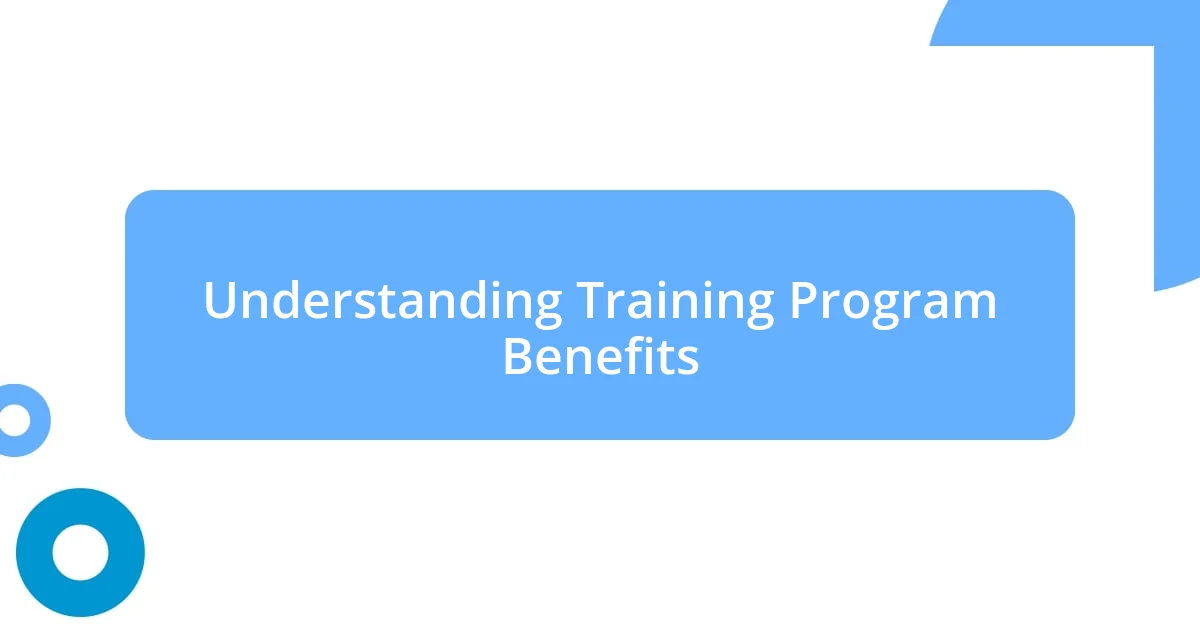
Understanding Training Program Benefits
Training programs are like stepping stones on the path to personal and professional growth. I remember the excitement I felt after completing a project management program; suddenly, tasks that once seemed overwhelming felt manageable. Isn’t it amazing how new knowledge can shift your perspective?
One key benefit I’ve encountered is the confidence boost that comes from acquiring new skills. After finishing a digital marketing course, I felt empowered to tackle challenges I used to shy away from. It was as if I had been handed a toolkit, and I couldn’t wait to see what I could build with it! Have you ever experienced that surge of motivation when learning something new?
Moreover, training programs often foster community and networking opportunities. I still keep in touch with peers from a leadership workshop I attended. Those connections have enriched my career in ways I never anticipated, proving that the benefits extend far beyond the classroom. How might establishing such relationships impact your career journey?
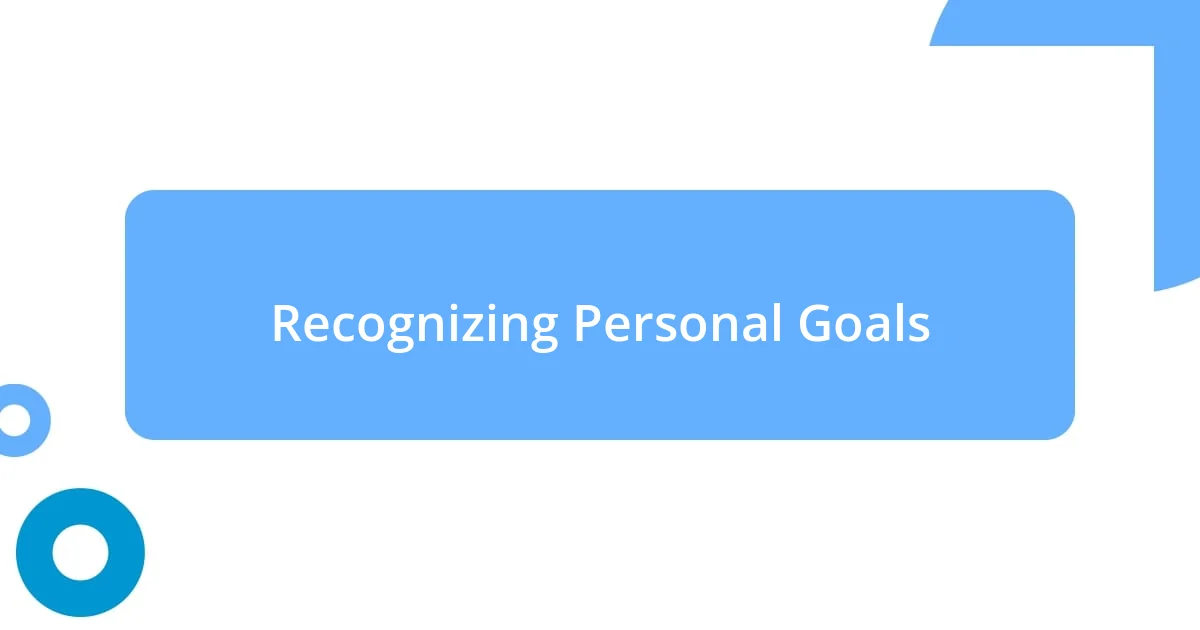
Recognizing Personal Goals
Recognizing personal goals is a crucial step in making the most of your training experience. I recall a moment after a time management workshop when I sat down and penned out what I truly wanted to achieve. It was eye-opening for me; clarifying my goals ignited a fire within me, guiding my focus. Have you ever had that moment of clarity when you realize what truly drives you?
Here are some reflective prompts to help you identify your personal goals:
- What skills did I acquire that excite me the most?
- How can I apply these new skills in my daily life or career?
- What changes do I want to see in my work or personal life?
- When do I want to achieve these goals?
- Who can support me in this journey?
Taking the time to contemplate these questions can solidify your path forward. I often revisit my goals after any training, allowing myself to adjust and refine them as I grow. It’s such a rewarding process.
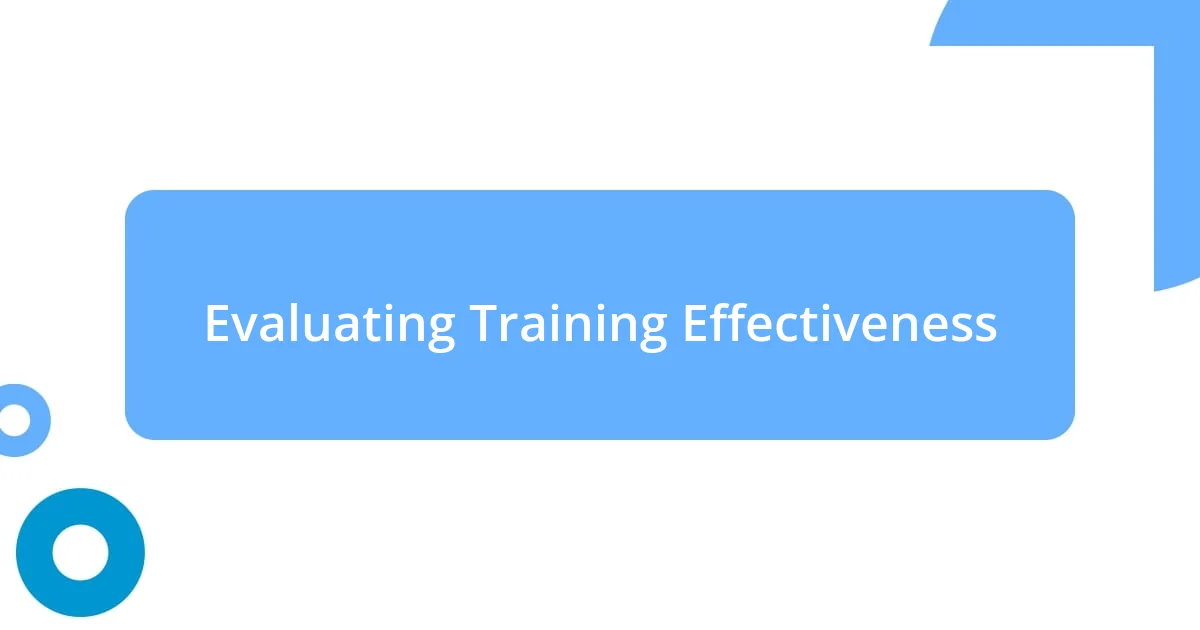
Evaluating Training Effectiveness
Evaluating the effectiveness of training programs is something I find both crucial and enlightening. One of my favorite methods has been to gather feedback from participants—not just formal evaluations, but real conversations. I often notice that hearing how others perceive the changes in themselves can provide a broader context for my own growth. Have you ever reflected on how others view your development?
I also appreciate the value of measuring outcomes through specific metrics, such as performance improvements or increased productivity. After a sales training session I attended, I tracked my sales numbers for several months. The results were astounding! Not only did my numbers rise, but my confidence while approaching clients soared. Relying on data to back up personal feelings is incredibly reassuring, don’t you think?
Lastly, it’s important to consider the long-term impact of training. I once engaged in a leadership program that, a year later, still resonates in my decision-making process. The concepts I embraced during that course continue to shape my leadership style. In my experience, effective training manifests in both short-term wins and enduring transformations. Isn’t it powerful to realize that learning is a lifelong journey?
| Evaluation Method | Description |
|---|---|
| Participant Feedback | Gathering qualitative insights through conversations and informal discussions. |
| Performance Metrics | Measuring changes in productivity and efficiency post-training. |
| Long-Term Impact | Assessing how training shapes skills and decision-making over time. |
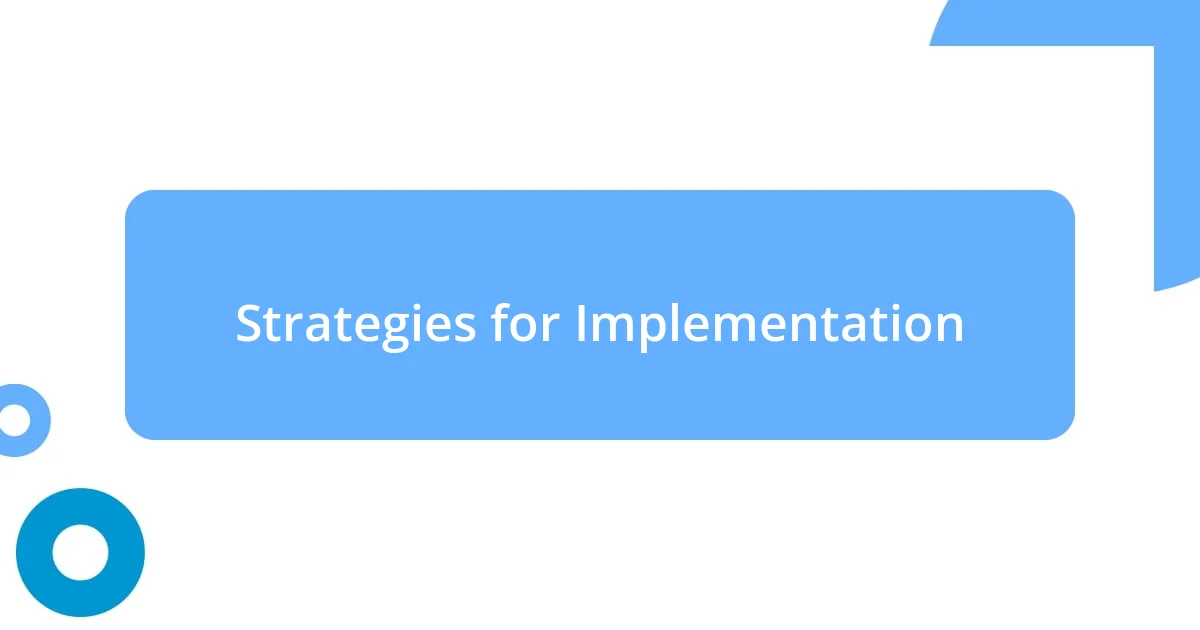
Strategies for Implementation
When it comes to implementing what you’ve learned, starting small can often lead to impactful changes. I remember the first time I tried to apply a new communication strategy after a workshop. I decided to use it in my next team meeting. Initially, I felt nervous, but as I practiced, I gained confidence. Have you ever felt that rush of excitement when something new clicks into place? It’s all about finding those initial opportunities that help you build momentum.
Creating an action plan can really streamline your path forward. I often break down my goals into manageable steps, with specific deadlines. Once, after a training session on project management, I mapped out a timeline for implementing these techniques on my current projects. This approach not only kept me accountable but also made the changes feel less overwhelming. When you have a roadmap, it’s easier to navigate the twists and turns of any new strategy, isn’t it?
Finally, sharing what you’ve learned with others can reinforce your own understanding and commitment. I often host informal lunch-and-learn sessions with colleagues, where we discuss insights from training programs. These gatherings encourage open dialogue, and I find that it solidifies my knowledge while fostering a collaborative environment. How do you motivate yourself to retain and share what you learn? Engaging in discussions is a powerful way to transform knowledge into action.
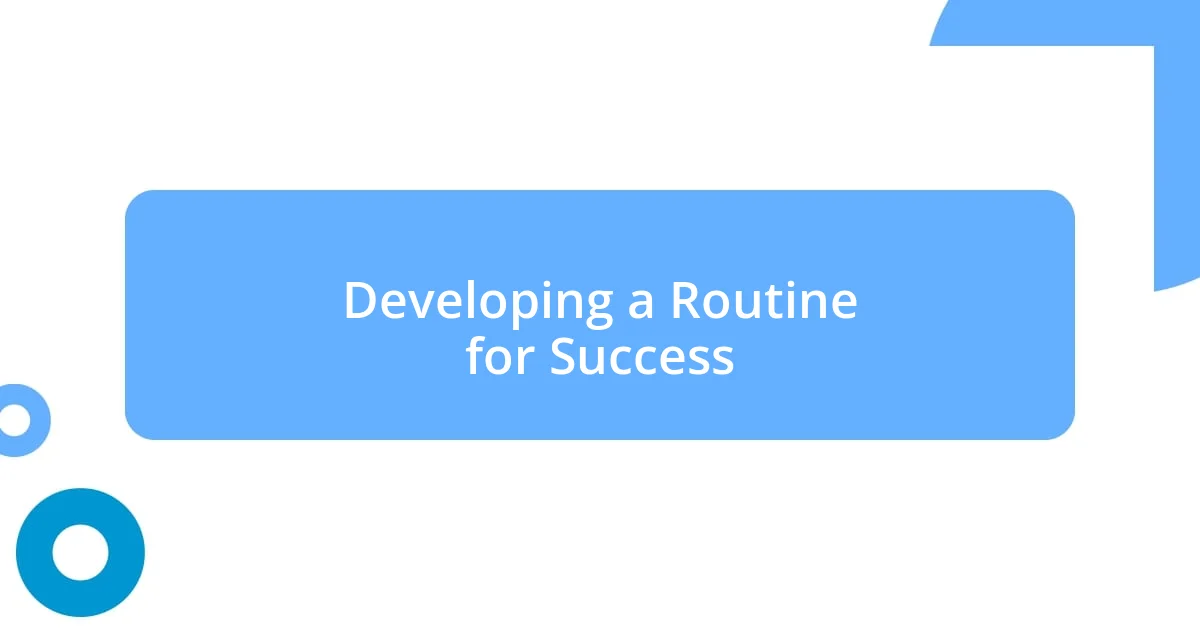
Developing a Routine for Success
Developing a routine that supports success after training programs is something I’ve found to be a game-changer in my journey. One practical step I’ve taken is setting aside specific times each week for practice. For instance, after I attended a time management workshop, I dedicated Wednesday afternoons solely to revising and applying those techniques. It wasn’t just about remembering what I learned; it became a ritual that transformed how I approached my tasks. Have you ever noticed how regularity can anchor your learning?
I’ve also discovered the power of accountability in my routine. Partnering with a coworker after a training session helped tremendously. We set weekly check-ins to discuss our progress and any challenges we faced. I vividly recall a moment where I shared my struggles with implementing feedback techniques, and the conversation provided fresh insights. Doesn’t having someone to share the journey with make it feel lighter?
Lastly, I integrate reflection into my routine, which often leads to profound insights. Every Sunday evening, I take a few moments to jot down what worked and what didn’t during the week. I find this simple practice helps me celebrate small victories and plot adjustments for the following week. After a recent training on creative thinking, I realized I was hesitating to try out new ideas at work. Reflecting on this opened my eyes to the fear holding me back, which I could then address. How do you process your experiences to foster growth? Making time for these reflections has truly allowed me to thrive post-training.
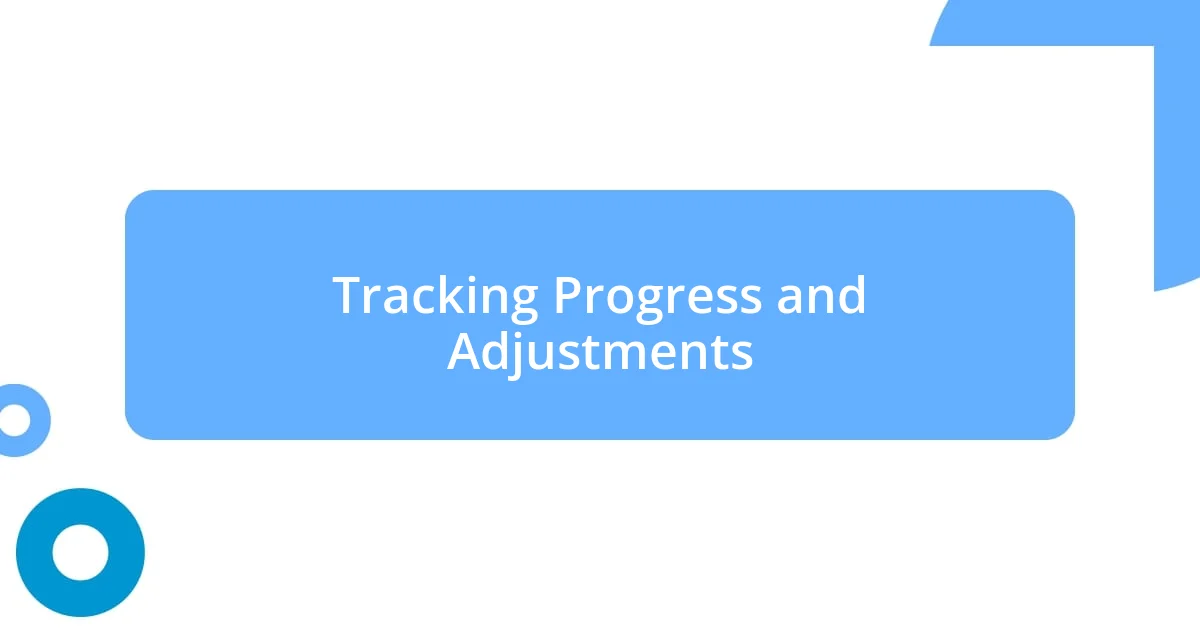
Tracking Progress and Adjustments
Tracking progress after training involves regularly assessing how well you’re incorporating what you’ve learned. I remember after a leadership workshop, I created a simple spreadsheet to monitor my progress on applying those new skills. Each week, I’d reflect on how I handled team discussions. It was surprising to see how my anxiety gradually faded and my effectiveness increased. Have you ever realized that tracking doesn’t just highlight improvements but also reveals areas needing attention?
Adjustments are equally crucial in this journey. After a few months of tracking, I noticed that my goal of leading meetings was still a challenge due to my hesitation in decision-making. To address this, I sought feedback from trusted colleagues on my style. Their insights provided clarity and led to targeted practice sessions, which drastically improved my confidence. Doesn’t it feel empowering to see adjustments lead to inspirational growth?
Ultimately, the act of tracking and making adjustments fosters a continuous learning loop. I find myself excited to review my progress, almost like a personal check-in that keeps me motivated. One day, while analyzing my data, I uncovered patterns in my successes and setbacks. Recognizing these trends allowed me to make informed shifts to my approach, enhancing my training practices. Isn’t it amazing how simple reflection can create profound change?
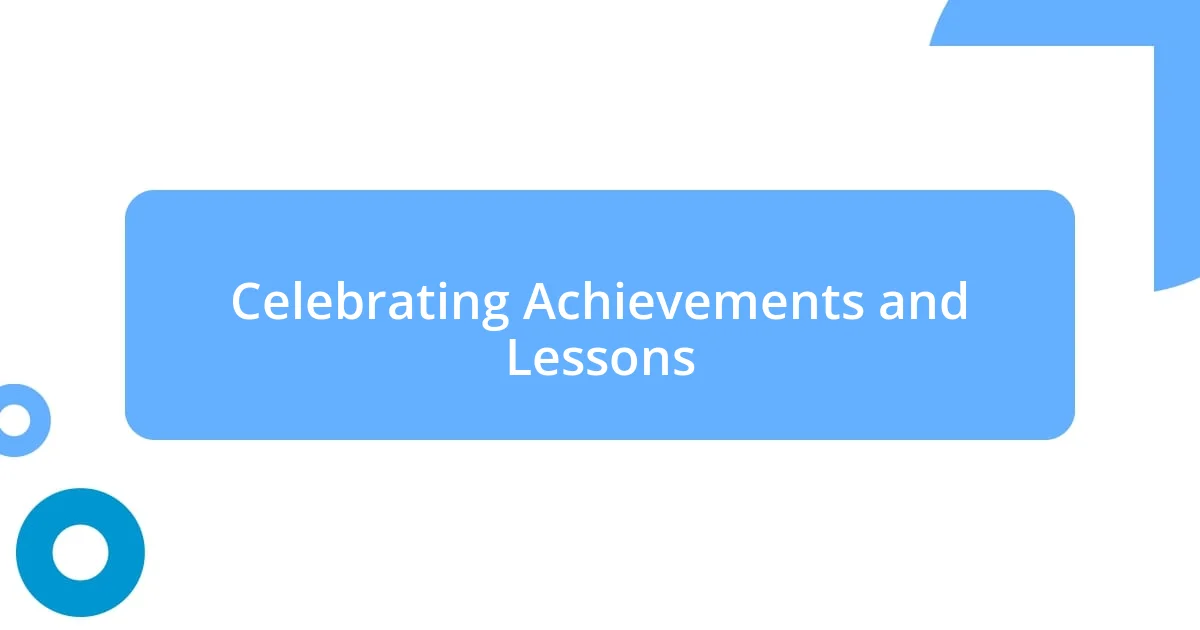
Celebrating Achievements and Lessons
Celebrating achievements, no matter how small, has become an essential part of my post-training routine. I remember coming home after a particularly intense training session and treating myself to a favorite meal. That little gesture felt like I was not just celebrating the knowledge gained, but also affirming my commitment to apply it. Have you ever found joy in simply acknowledging your hard work?
Reflecting on lessons learned is equally important in this process. After a recent project where I successfully implemented a strategy learned in training, I took a moment to write down what I’d done differently. Those lessons became my guide for future endeavors. It struck me how valuable it is to savor both the triumphs and the hurdles, as they provide a complete picture of my growth. Doesn’t it make sense to celebrate the journey and not just the endpoint?
Additionally, sharing achievements with peers amplifies the experience. I recall inviting my colleagues for a casual lunch after achieving a team milestone. The laughter and stories exchanged not only strengthened our bonds but also reinforced the importance of collaboration. Celebrating together can turn individual successes into communal victories. How often do we take a moment to recognize the collective efforts that lead to personal growth?














